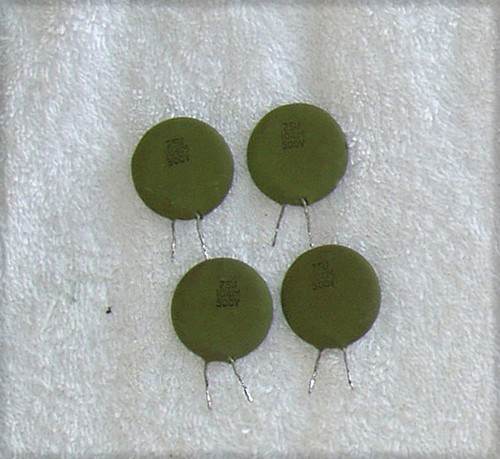HISTORY:
Where on earth did this transducer come from?
EX specialised laboratory equipment which was designed for the measurement of sound pressure waves at high audio frequencies, in fact right up to the ultrasonic range around 40Khz
This component definitely belongs in the realm of the "experimenter", very nicely constructed (NO plastics!) and that large piezo disc provides stunning sensitivity!
MANUFACTURER UNKNOWN - Piezo Element Transducer
There is a manufacturers logo in the centre of the piezo element but I cannot "make out" what it says because it is VERY small print.
Gold plated disc backing and side counter weight
Outer frame & a single yellow insulated wire constitute the connections to the element
Disc diameter: 14.75mm
Component dimensions:
33.5mm L x 20mm W x 18mm H
Mounting can be either vertical or horizontal to a PCB using a strong metal "leg" to one side of the element disc. This leg is 4mm diameter x 10.5mm length. A small rectangular metallic tab is then intended to fit into a PCB - this is one "side" of the transducer.
The yellow wire from the centre of the element is approximately 30mm in length
On the other side of the element is a counter weight, I can see no electrical purpose for it being there. It measures 13.5mm in length x 7mm diameter at the widest section.
See my notes under TESTING about this "counter-weight"
COSMETIC CONDITION:
NO damage (physically or electrically)
Relatively clean, just gave the metalwork a light cleaning to try and view any manufacturer markings. Initially I thought the metalwork was brass but I am now convinced it is in fact Gold plating - it was much easier to clean up than Brass normally is.
TESTING:
DC resistance of the element is extremely high, as you would expect from a piezo element
Connecting to a scope I was truly stunned at the sensitivity of the element. ANY slight movement (physical or sound waves hitting the element) caused immediate and significant voltage changes, I was easily able to achieve an output of 3V with low level "hand clapping" in front of the element, a distance of about 2 metres away.
Interesting too was the fact that the counter balance seems to enhance the sensitivity to movement in particular - even the very slightest of movement on this section of the transducer produced very obvious voltage changes at the transducer output.
Originally this component was housed in a special "isolation chamber", this could be why! It is so sensitive ...
Quite an extraordinary component and well worth a "play with" if you need a highly sensitive sound or movement transducer - just picking it up and moving it slightly also created a significant voltage output.
Since taking the photographs and testing I have now placed it on a foam sheet and sealed as a clear plastic packet to protect it from the "elements"














